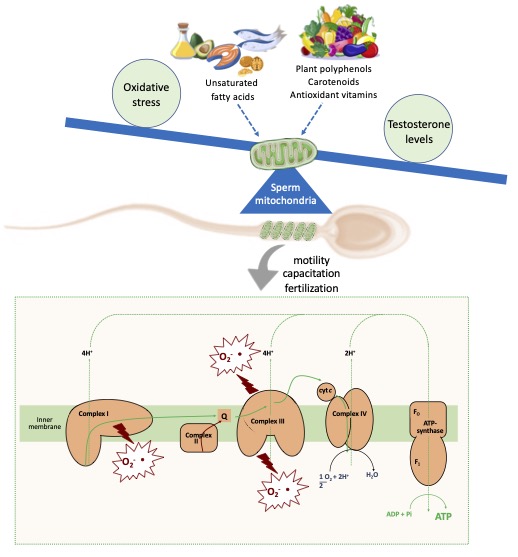Diet might affect male reproductive potential, even though the biochemical mechanisms involved in the modulation of sperm quality remain poorly understood.
While a Western diet is considered a risk factor for male infertility, the Mediterranean diet seems to protect against male infertility; moreover, the role of a vegetarian habitus in the preservation of sperm quality is controversial.
Diets rich in saturated fatty acids (SFA) and low in polyunsaturated fatty acids (PUFA) negatively affect sperm quality, whereas unsaturated fatty acids supplementation ameliorated sperm quality. In fact, administration of PUFA, especially omega-3 PUFA, determined an increase in mitochondrial energetic metabolism and a reduction in oxidative damage. Carbohydrates and proteins are also nutritional modulators of oxidative stress and testosterone levels, which are strictly linked to sperm mitochondrial function, a key element for sperm quality. Moreover, many dietary natural polyphenols differentially affect (positively or negatively) mitochondrial function, depending on their concentration.
- spermatozoa
- infertility
- obesity
- fatty acids
- sugar
- bioactive molecules
Diet may be an important modifiable determinant of male reproductive potential. Therefore, the role of daily nutrient exposure needs to be highlighted to preserve male fertility or to prevent male infertility. A strong adherence to a healthy dietary pattern based mainly on plant foods and fish is positively correlated with indicators of sperm quality.
Differently from the Western diet, Mediterranean diet, which is one of the healthiest dietary patterns, has evident health benefits, including benefits in terms of semen quality parameters. This diet is characterized by a high consumption of legumes, cereals, fruits, vegetables, a moderate consumption of fish and wine, and a low consumption of dairy products and meat; olive oil is the main source of added fat. Thus, the Mediterranean diet is rich in monounsaturated fatty acids (MUFA), fiber, and antioxidants, and low in saturated fat (SFA).
Although the picture of the complex relationship between nutrients and sperm quality is far from complete, some indications can be drawn. First, the amount and quality of the nutrients introduced can act on sperm quality by acting on sperm energetic metabolism. Then, diets rich in SFA and low in PUFA or with an unbalanced ratio omega-6/omega-3 PUFA negatively affect sperm quality, whereas dietary unsaturated fatty acid supplementation ameliorated sperm quality. While an excess of simple carbohydrates negatively affects sperm function, there are no studies about the role of complex carbohydrates on male reproductive potential. Lastly, a low protein diet, as well as the deficiency of some specific amino acids, have been considered a potential risk factor for male-factor infertility.
Fat, carbohydrates, and proteins affect sperm quality, by acting on oxidative stress and testosterone levels, whose common target are mitochondria. Mitochondria are key organelle supporting several sperm functions. Since they are involved in energy production, ROS homeostasis and steroid hormone biosynthesis, all molecules that can influence this crosstalk, may affect male fertility. Among these molecules, dietary fatty acids, and natural polyphenols act as modulator of sperm mitochondrial function.
In fact, the administration of PUFA, especially omega-3 PUFA, determined an increase in the activities of mitochondrial enzymes involved in gamete energetic metabolism and a reduction in oxidative damage. Moreover, many dietary natural polyphenols (mainly flavonoids) found in fruits and vegetables differentially affect (positively or negatively) mitochondrial function, depending on their concentration. Therefore, the modulation of sperm mitochondrial function could play a key role in the improvement of sperm quality.

This entry is adapted from the peer-reviewed paper 10.3390/ijms23052542
